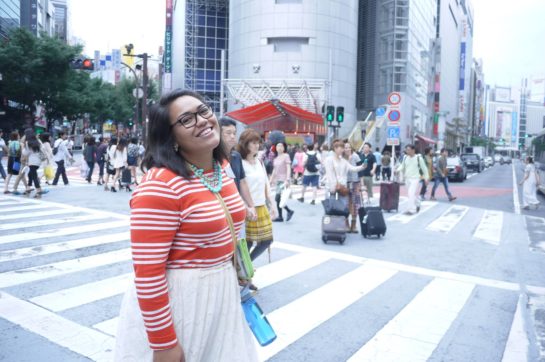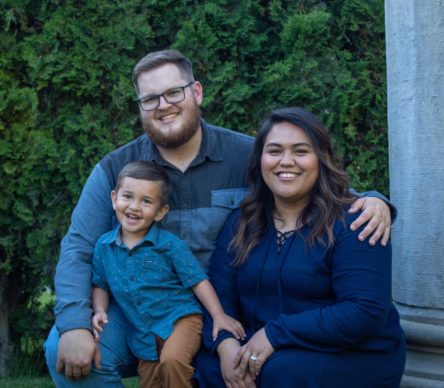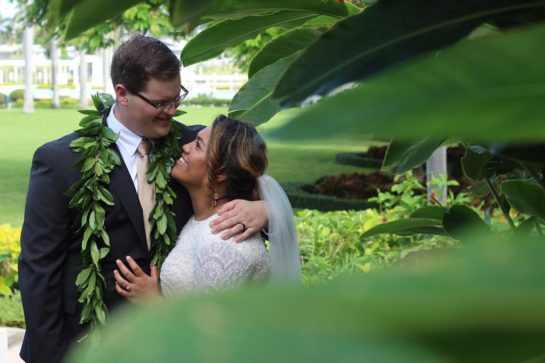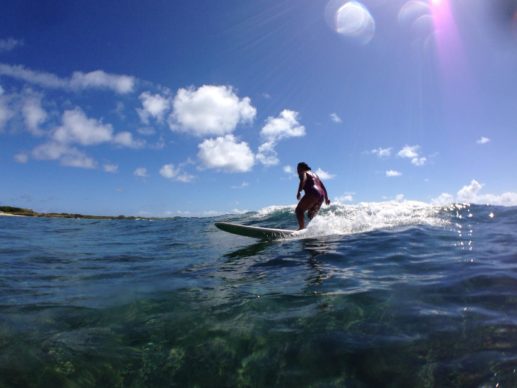Miyamoto Jensen came home from her mission depressed and anxious. She found healing and purpose in doing her family genealogy. Her work as a professional genealogist has informed how she thinks about the gospel, family, race, and trauma.
You are a family historian and genealogist. How did you get started in that field of work?
I first got really interested in family history when I finished serving a mission for the Church in the Japan Tokyo Mission. I noticed how a lot of Japanese people were so dedicated to their ancestors. They showed reverence and love to them by worshipping them. They brought food to them at their graves and participated in other ceremonial acts. My mom is part Japanese, so seeing that in person helped me realize that my ancestors did similar things. While we don’t believe in bringing food to our ancestors’ graves here in America or even in our religion, seeing that outward devotion was very heart turning.
While on my mission, I struggled a lot with depression and anxiety. It got to the point that I decided to go home at my 7.5 month mark. When I arrived home, I went to therapy right away. My therapist helped walk me through everything. For a whole month, I went to the temple every single day. I know I needed that peace and serenity as I tried to figure out life. Questions ran through my head, “What’s going on? How can I heal? When am I going back on my mission?” After being in the temple for a month and going to therapy, I decided to become a temple worker. I served as a temple worker for several months. A few months later I had to make the decision about if I was going back on my mission. The answer was no. That was from God.
It was devastating for me. I worried about what everyone else would think. As I struggled coming to that decision, I found so much joy in doing family history work. I saw how wonderful the experiences were for other people when they did temple work for their ancestors. I thought, “I want a piece of that. I want to have that for myself.” I called my grandma and she asked me to meet her at the family history center. We sat down and she pulled up FamilySearch. She said, “This is FamilySearch and this is the family tree.” She walked me through how to find names and records and how to verify information. Doing family history carried me through that very difficult time and ultimately helped me to heal from my circumstantial depression and anxiety.
I’ve been hooked ever since then. I knew family history is what I wanted to do. I realized I was good at it and wanted to be better. I also realized I could make a living off of this while also being a mother and wife. Knowing this career path would make that balance possible made it more appealing. I recognized the healing power of family history work and the temporal blessings that come from it: providing for my family, having a balance, and finding joy.

Miya on her mission
You mentioned that you have Japanese heritage. What was it like growing up with a multiethnic background?
I grew up in Laie, Hawaii. Growing up multiethnic is normal there. Everybody is multiethnic. It was common to have a mom of one race and a dad of another. I grew up thinking this was how the world worked and how everyone was. It wasn’t until I moved to the continental United States to go to BYU-Provo that I recognized what it meant to be multiethnic outside of my comfort zone and the background of my upbringing. It was a shock to me. I didn’t realize how many people didn’t understand or know things about my culture. Hearing people ignorantly say negative things about my culture was and still is really hard for me.
It is such a beautiful thing to be more than one race. It means that my identity covers a lot of the world. That brings much joy to me. I realized that my ancestors had to all come together in order to make me. That’s the only way I could be here and I’m so glad their lives came together to make that possible.
Understanding my ancestors’ backgrounds is deeply fulfilling. In Japan, my ancestors experienced struggles so they moved to Hawaii to work. Whereas, my Hawaiian ancestors were already struggling, but they found joy in striving to reconstruct themselves, remember who they were, and bring back to their culture things that were erased in the past. There’s just so much resilience in that and it has all been passed down to me. All in all, it’s wonderful to know these stories from many different parts of the world that make up who I am. Resilience has been passed down to me and is going to be passed to the future as well. Knowing this has fueled me in my work to understand not just one specific area, but to focus on the whole Pacific Islands and even parts of Asia. Understanding these cultures is empowering. Growing up multiethnic has brought me a lot more peace and understanding for other people and cultures.

Miya Jensen
How do you approach learning about someone from a different background and how might someone actively learn about a culture that is different from their own?
Make the choice to be antiracist when you are trying to understand another person’s background. There is a difference between being antiracist and being ignorant. Choose to step outside of ignorance and become active in being antiracist. Take the time to learn about another culture. Sit down with people who are different than you. Go to another culture’s events and walk around exposing yourself to the many different roles that ethic people have taken upon themselves. For example, my husband and I are planning to take our son to different areas of Utah to help him better understand the diversity within our community. We want to expose him to arts, music, and the sciences from a diverse set of perspectives found in our surrounding communities. Meeting and learning directly from those communities helps break down incorrect stereotypes.
Let people share their differences with you. Be open. Come from a place of love. When people know you love them, they will be willing to talk to you and show you what they see and experience. I think coming across with love is the most important thing. You’ll make mistakes. Everybody does. No one is perfect. Create such a good bond with people that are different from you that they can tell you when something you said made them uncomfortable or when something difficult has happened and affected them. You may not understand it, but choose to be there. Be open and honest. If people did that, I feel like there would be so much more understanding and peace in our country and in our world.
People don’t want to be labeled as racist. No one wants to be called that especially since it’s such a hot topic right now. Being active in being antiracist is something all of us can do. Because it is uncomfortable, we have to bring these things up and talk about it. These conversations will lead to change.
Recently on social media, you have also been talking about multigenerational trauma. What is it and what role does family history play in healing that abuse and trauma?
Generational trauma is an uncomfortable topic for many people, but it’s something that needs to be brought to the light. Generational trauma is trauma that has been passed down from one generation to another. That trauma comes from many different experiences and can be categorized in multiple ways. Intimate trauma is trauma within a family unity. Bystander trauma is a result of witnessing something very terrible. Historical trauma is where a collective group of people experience a historical event that traumatized them.
Generational trauma can happen to everybody, not just minority groups. There’s trauma in alcoholism, in sexual abuse, in drug addictions, and so many other big and terrible things. The side effects include depression, anxiety, suicidal thoughts, obesity, heart disease, cancer, and many other chronic illnesses and disorders. Generational shame goes hand in hand with this trauma.
In my family history research, I’ve seen that every family has something that has happened or is going on that can lead to generational trauma or shame. I’ve been asked if I believe that many people are sick today because of generational trauma. I’ve thought about that a lot because today, everyone is struggling with so many different things. Is it that back in the day that no one struggled or is it because no one talked about it so we don’t have that data from the past? I don’t know. But I do know that everyone needs healing and family history can be a means for helping someone heal.
When I look at my own family right now, I can see that some things are just messed up. These things are difficult to talk about. That’s where the shame comes in. No one wants to talk about it. If you did talk about it, that is shameful. But then at the same time not talking about it is shameful. It’s just shame, period. Looking at my family, I ask, “Where did this start? How did it happen?” When I look closely at my family history I can see where it started and began to be passed down. The pattern keeps going and going.
The real healing begins as we try to understand where these issues began and where they are now in our families. That’s where self-awareness comes in and where we can choose to stop the cycle and stop passing down generational trauma and shame. Instead, let’s pass down generational healing and wholeness. Identifying those things is a good step. There is healing, but that can only come after the problem is identified. Individuals may be too embarrassed to talk about the problems that come up or the problem may be too heavy. That’s where we need the support. If you need to, go to therapy and talk with a professional. There are many support groups out there to help people. This is all meant to heal. For some people these topics are very painful to bring up. Overall, it is meant to be a means to finding peace to heal you, heal the future, and heal your ancestors as well.

Miya Jenson and her family
Where does someone start with using family history as a tool for healing?
Start by identifying the culture behind talking about these things. In some cultures, it is extremely taboo to bring up these types of sensitive issues. You have to recognize that it’s ok to challenge the culture. It’s scary and it’s not easy. I get flak from my family. When I try to explain that my actions are trying to help, someone may tell me, “You can’t do this. It is not ok.” You have to understand that this might happen, but you have to accept it. It’s easier said than done and the experience will be different for everybody.
Find someone who can help you with that, an ally. That can be someone in your family or a friend. I like having someone outside of the situation to be my support. Someone who is unbiased and can help me navigate what is going on. Having that support can really help. That support can also take the form of a professional therapist. I also recommend that you read up on these problems and do some research from credible sources to help you understand these problems and the nature of these issues. Those are great first steps to help move forward with understanding and healing in generational trauma.

Miya and Shad Jensen
Why do you find it so important to bring these things to light and share that truth?
I feel so strongly about it because I see it in my own family. I don’t want to see trauma passed down in my family. I don’t know if I can stop it by speaking up about it. It makes me sad. These are things that can be fixed now. They are preventable from being continued on. I come from a family of hard headed, strong willed people. That’s who I am too. If I can still speak up about it I will. My hope is that someday some specific people in my family will listen and understand. More importantly I know how powerful it is to share this type of information and to share our stories. People are looking for relatability. It’s a human need. People are trying to understand what the heck is going on. If me speaking up means someone is finally putting a name to what they’re experiencing then that is what I hope to accomplish. Being able to identify this shame and trauma is part of healing. I speak up to hopefully help my family and myself to heal more, and be more open and to help others.
Do you have one piece of advice you would give to someone who wants to connect with their family in general? Where do you start with family history?
Be open to whatever you find. Your idea of what your family is will most likely be challenged. Be ok with that and understand that you will find surprises. These surprises may either make you want to jump up and cheer or bring you down to the floor. That is ok. There is nothing wrong with you if any of those things happen where it’s just a shock or if it’s more than what you were anticipating. Be open. Be realistic. Be excited. Be understanding.
If you want to get into research, start by going onto FamilySearch.org. Pick a concise and specific research objective. I go in and say, “I want to find the birth date and place of my great-great-grandma Emma.” Write your objective and go back to it, so you won’t go on a wild goose chase finding wonderful things that will send you searching for other objectives.
I’m hopeful that there will be more Polynesians and Pacific Islanders that come into family history work. We need them. When I came into the genealogy industry, I knew I would be a pioneer making the first steps with Polynesian genealogy. Sometimes it’s difficult to keep going, but I do because I know there will be more people along the way who are doing this work and following my example. I invite any and all to hop on board. It really is a wonderful place and wonderful group of people to be a part of.

Miya Jensen
Is there anything else you want to add?
Knowing your story, knowing where you come from can give you what you’ve always been looking for which is your self-identity and self-confidence.
In the Pacific Islands, there are a lot of oral traditions and oral genealogies. There’s been this assumption for the past century or so that oral traditions are not credible and they don’t bring any sort of validity to a culture. This idea is completely false. I want to say that now and boldly. Because we have oral traditions, because we have oral genealogies, we can and we must do our family history work in the Pacific Islands and in any other culture around the world that does oral genealogies.
Every culture is wonderful and every family looks different. There is nothing wrong with that. Now that I do this professionally, I better understand that families look different and that is a beautiful thing. They are meant to. There is no one specific way that is correct. I want to help people see that families look a lot different than what we understand here in the west. These differences need to be celebrated more. They are beautiful and wonderful.
God is found in every culture. I have seen Him in every single family that I’ve looked into. He truly does love all of His children. He really does. When He says all, all means all. Again, I know that He is aware of everyone. Everyone who has ever been born, everyone who is here, and whoever will come. He is aware of every single person and loves every single family.
At A Glance
Age: 27
Location: Provo, UT
Marital history: Married to Shad Robert Jensen of Marsing, Owyhee, Idaho on November 13, 2015 in the Laie Hawaii Temple
Children: One boy; 3.5 years old
Occupation: Professional Genealogist
Convert? : Born in the covenant
Schools attended: Brigham Young University - Provo (BA Family History & Genealogy - Polynesian Emphasis)
Languages spoken in the home: English; Hawaiian
Favorite Hymn: I Stand All Amazed
Social: @thepolynesiangenealogist
Website: www.thepolynesiangenealogist.com
Interview Produced By: Anne Leishman Merrell
